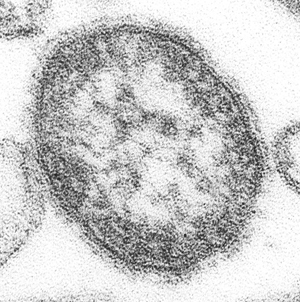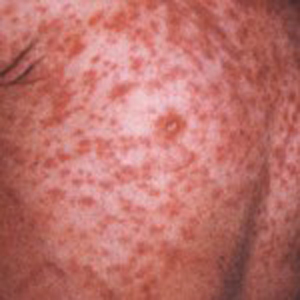
By David F. Rooney
Red measles, the most contagious vaccine-preventable virus affecting humans, is loose in Revelstoke and poses a health risk to small children and unborn children, says Dr. Andrew Larder, the Interior Health Authority’s senior medical health officer.
This airborne virus was identified here last Friday and IHA staff have been attempting to identify and locate everyone who has come into contact with one of the four people believes to have contracted it here, as well as one person in Vancouver who may have contracted it while visiting Revelstoke.
Larder said in an interview Wednesday that those people most at risk are children under five years of age and unborn children. While it will not — unlike German measles (Rubella) — cause foetal abnormalities, red measles (also called rubeola or morbilli) can cause pregnant women to miscarry. In very young children measles can have serious complications. It can lead to bacterial infections such pneumonia and, in very rare instances (1 in 1,500 cases) brain tissue can become inflamed, causing encephalitis.
Measles were once the most common childhood illness until effective vaccines were developed. In the early 1960s, over half a million children were infected every year. In 1963, the creation of a measles vaccine changed everything. Today, while very few new cases of measles occur each year in developed countries, it still occurs in epidemic proportions in developing areas.
Adults born before 1957 are regarded as having natural immunity to measles since they almost certainly had it in childhood. However, while most people born after 1957 probably were vaccinated they should be aware that initial vaccination programs only provided one inoculation per person. Today, two inoculations are recommended. If you or anyone in your family has not had two does of measles containing vaccine, please contact the Revelstoke Health Center (250-814-2244) to discuss immunization.The measles vaccine is free for everyone born in 1957 or later.
Outbreaks like this are complicated by the fact that some parents refuse to believe in the value of inoculation programs. They should be aware that people who need but refuse treatment can be quarantined, Larder said.
For one or two weeks after an infection, the virus multiplies without causing any symptoms. This is the incubation period. After that, symptoms such as cough, fever, runny nose, red eyes, and tearing will appear. Children may also become irritable.
About two days after initial symptoms appear, small, red, irregular spots with a whitish or bluish centre called Koplik’s spots develop on the inside

of the cheeks near the molars. About two days after Koplik’s spots develop, a rash (large brown or red blotches) develops behind the ears, and perhaps on the forehead and face, and can spread to the trunk, arms, and legs. The rash usually begins to fade within 5 days, often starting at the head before it clears up in the lower parts of the body. Once the rash has completely disappeared, the skin may appear a bit brownish and the top skin layers may peel off soon afterwards.
The rash isn’t painful and usually does not itch. Some people may experience increased sensitivity to light, and their eyes may become red and inflamed. During the peak of the infection, a fever may develop with a body temperature as high as 40°C (104°F).
Measles is contagious for about 4 days before the rash appears and about 5 days afterwards. It is very important for people with measles to stay away from others so they won’t get infected.
Vaccines are available by calling the Revelstoke Health Clinic at 250-814-2244 for an appointment.



